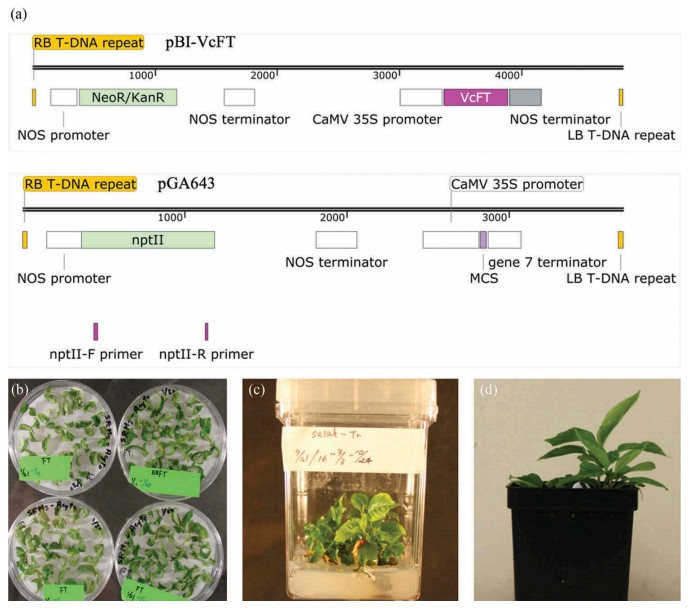Sweet cherry (Prunus avium L.) is an economically crucial temperate fruit tree. The sweet cherry industry is interested in developing varieties with enhanced pest and disease resistance, increased tolerance to abiotic stresses, and improved fruit quality. Like other fruit tree varieties, traditional sweet cherry breeding is a difficult, lengthy, and expensive process due to heterosis, polyploidy, long breeding cycles, lack of germplasm resources, and lengthy field trials. Genetic transformation of sweet cherry is ideal for achieving breeding goals through direct manipulation of genes of interest. This has been demonstrated in sour cherry (P. cerasus L.) and cherry rootstock (P. cerasus × P. canescens). However, most cherry varieties, including sweet cherry, remain challenging to regenerate and transform due to the lack of effective plant regeneration systems through organogenesis or somatic embryogenesis. A reliable transformation system relies on efficient plant regeneration, efficient gene delivery, and effective selection without using antibiotics or herbicides. The lack of effective plant regeneration systems is a bottleneck in cherry transformation, and these systems often need to be optimized for individual genotypes.
 Fig. 1. Stable transformation of sweet cherry ʹSelah 1ʹ. (Zong et al., 2018)
Fig. 1. Stable transformation of sweet cherry ʹSelah 1ʹ. (Zong et al., 2018)
Lifeasible is an industry leader in plant genetic transformation, providing cutting-edge genetic transformation services for sweet cherries. Our experts are dedicated to developing stable transformation protocols and producing stable transgenic sweet cherry. In addition, we offer genetic transformation of several other commercially essential genotypes, including sour cherry, chokecherry (P. virginiana L.), and the cherry rootstocks 'Rosa' (P. subhirtella autumno), 'Gisela 6' ( P. cerasus × P. canescens), 'Colt' (P. avium × P. pseudocerasus), 'Inmil' (P. incisa × P. serrula) and 'Damil' (P. dawyckensis).
We provide the following high-efficiency strategies for the genetic transformation of cherries. Our solutions are simple, fast, safe, and efficient, expressing foreign genes and producing high expression levels without integrating them into the genome.
Optimizing Sweet Cherry Regeneration Systems
In vitro, tissue culture and plant regeneration are necessary steps for a stable cherry transformation method. The regenerative capacity of plant cells generally varies among species, cultivars, and explant types. We have a strict control system for factors affecting cherry regeneration, including biotic factors (genotype and explant type) and abiotic factors (such as culture medium and environmental conditions). Our experts work on optimizing shoot regeneration of sweet cherry varieties using cotyledons and callus from different explants.
Agrobacterium-Mediated Sweet Cherry Transformation
We offer Agrobacterium-mediated transformation to deliver foreign genes into cherry cells. This method has many advantages, including low cost, ease of operation, and allowing single-copy insertion into transgenic plants, making it a popular method for cherry transformation. By utilizing Agrobacterium tumefaciens-mediated transformation of leaf explants, we can help customers produce stable transgenic sweet cherries.
Polyethylene Glycol (PEG)-Mediated Sweet Cherry Transformation
We develop an efficient protocol to isolate protoplasts from suspension-cultured cells of sweet cherry pulp and use green fluorescent protein (GFP) as a transient expression system for a reporter gene. We can optimize the factors that affect the effect of protoplast isolation and transfection, including the concentration of enzymatic solution components, enzymatic hydrolysis time, pH value of enzymatic solution, PEG concentration, and transfection time. This method has high conversion efficiency.
Lifeasible offers state-of-the-art genetic transformation services for Prunus avium L., providing growers and breeders with the tools to unlock the full potential of this extraordinary crop. If you are interested in our solutions, please contact us for technical consultation and quotation.
Reference
Lifeasible has established a one-stop service platform for plants. In addition to obtaining customized solutions for plant genetic engineering, customers can also conduct follow-up analysis and research on plants through our analysis platform. The analytical services we provide include but are not limited to the following:
STU-CRISPR System Improves Plant Genome Editing Efficiency
April 19, 2024
Application of Exosomes in Facial Beauty
April 12, 2024